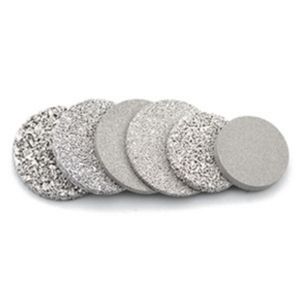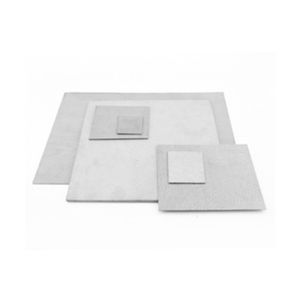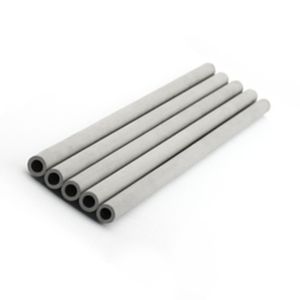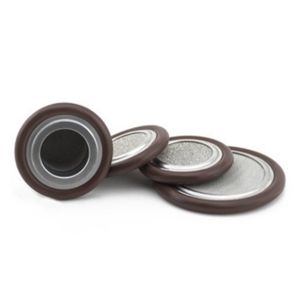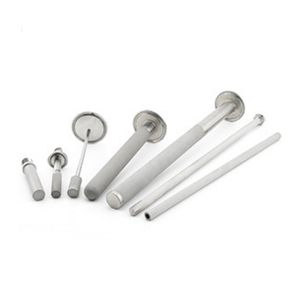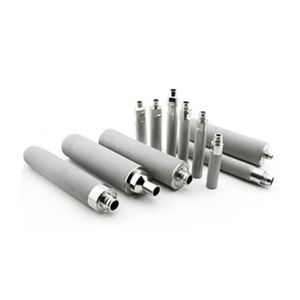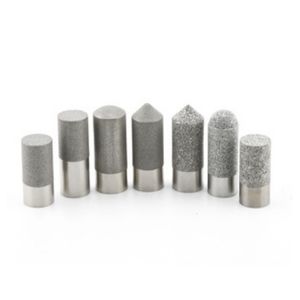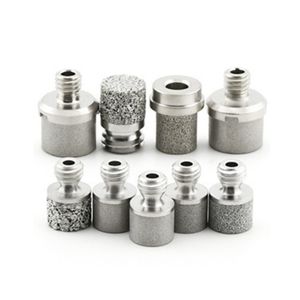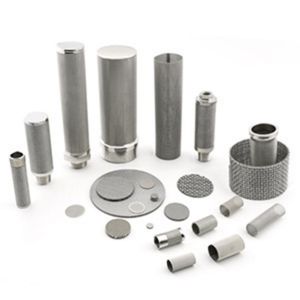Choose Your Metal Filters Style
Stainless Steel Filter / Bronze / Mesh Wire Sintered Filter
Stainless steel porous filter material disc, we can supply customized the shape is mostly round, flaky, single layer, multi-layer, pore saize etc, can bear a maximum temperature of 600° filter environment.
For porous metal sheets, same as sintered metal disc, can do custom size, pore size and thickness as your project / device requirements.
Porous metal tubes can be customized to a wide variety of applications and specifications. Variables such as length, diameter, thickness, metal material, and media grades etc
Suitable for most vacuum systems and offers additional benefits in terms of weight and cost reduction.
Reduced bubble size and increased gas transfer, resulting in lower gas consumption and increased upstream reactor throughput. Products can be customised to suit the application
This stainless steel 316L filter cartridge is durable, easy to install, and maintain. It offers uniform pores and is suitable for filtration, fluid distribution, homogenization, and applications like gas-liquid transfer, sound insulation, and purification.
Porous metal filter are available in a wide range of materials, sizes and fittings, so they can easily be specified with customer-specific features and configuration requirements. It is also possible to incorporate custom features or create completely original filter elements designed specifically for your needs.
The micro sparger is designed to divide the air stream into a number of fine streams which are ejected directly below the lower mixer and are stirred and crushed into smaller bubbles by the lower circular turbine paddle and mixed thoroughly with the medium.
HENGKO stainless steel mesh sintered filter is a new type of filter material with high strength and overall steel property, which is made of stainless steel wire mesh through special laminated pressing and sintered by vacuum, the mesh holes between each layer of the mesh are interlaced to form a uniform and ideal filter structure. It is widely used in the food and pharmaceutical industries, especially in pharmaceutical two-in-one and three-in-one equipment.
Why HENGKO Porous Metal Filters
HENGKO has been in the business of offering sintered metal filters for over 20 years. With the ability to design and manufacture filters with pore sizes ranging from 0.2μm to 100μm, our filters are specifically designed to catch chips, burrs, and wear particles before they compromise your system.
Our manufacturing capabilities include Stamping, Shearing, Wire-electrode cutting, and CNC Manufacturing, which allow us to produce small filters, cups, tubes, and various filtration structures to your exact specifications.
With our commitment to highest cost-effectiveness, we provide the best solution for your porous metal filter needs.
Contact us today with your requirements, and our HENGKO R&D team will supply the best solution for your device within 24 hours!
✔ Smooth Surface and Consistent Homogeneity
✔ Excellent Performance in Filteration Applications
✔ 100% Design and Test Based on Your Requirement
✔ Economical and Practical - Factory Price, No Middle Man
✔ Service from Engineering up to aftermarket support
✔ Expertise in various applications in chemical, food, and beverage industries
✔ Quality Guaranty - 20+ Years Sintered Metal Filters Manufacturer Experience
Our Partner
HENGKO is one of the most experienced enterprises in the field of providing sophisticated sintered stainless steel filter elements. With a professional technical team focused on developing and manufacturing high-requirement sintered stainless steel elements and porous materials, HENGKO has become a high-tech enterprise with a Key Laboratory and academic partnerships at home and abroad.

Quality Control for the Sintered Metal Filters
Applications
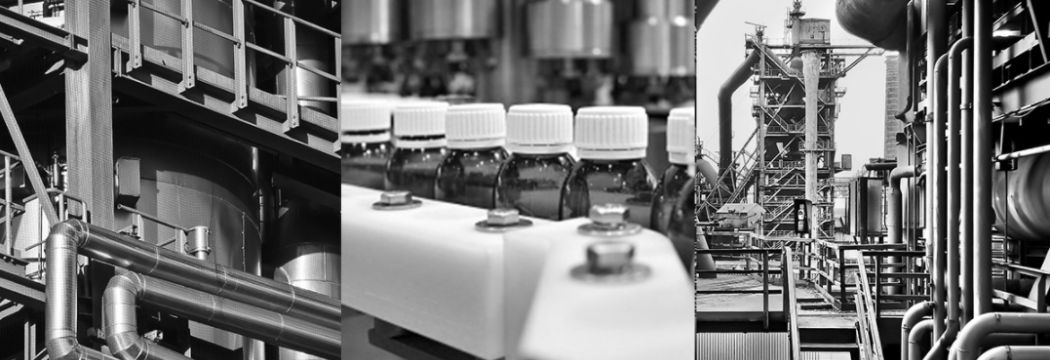
Liquid Filtration
Fluidizing
Sparging
Engineered Custom Solutions
WHAT WE CAN DO FOR OEM SERVICE
1. Any Shape : Like Simple Disc, Cup, Tube, Plate, etc
2. Customize Size, Height, Wide, OD, ID
3. Customized Pore Size / Apertures from 0.2μm - 100μm
4. Customize Thickness of ID / OD
5. Single Layer, Multi-Layer, Mixed Materials
316 / 316L Stainless Steel, Bronze, Nickel, Titanium. Mesh Wire
6. Integrated Design with 316 / 316L Stainless Steel Housing
Applications of Porous Metal Filter
1. Medical applications:
Porous metal filters made from 316L stainless steel can be used in medical applications for filtration of blood, serum, and other bodily fluids. They can also be used in implantable medical devices for drug delivery, where the high surface area of the filter allows for controlled release of drugs over a longer period of time.
2. Water treatment:
Porous metal filters can be used in water treatment applications, where they can remove contaminants such as heavy metals, bacteria, and viruses from water. The high surface area of the filter allows for efficient filtration, while the durability of the 316L stainless steel ensures a long lifespan.
3. Food and beverage industry:
Porous metal filters can be used in the food and beverage industry for filtration of liquids such as wine, beer, and juices. The high flow rates and filtration efficiency of the filter ensure a high-quality end product, while the stainless steel construction ensures durability and resistance to corrosion.
4. Oil and gas industry:
Porous metal filters can be used in the oil and gas industry for filtration of fluids such as crude oil and natural gas. The high temperature and chemical resistance of 316L stainless steel makes it ideal for use in harsh environments, while the high flow rates ensure efficient filtration.
5. Pharmaceutical industry:
Porous metal filters can be used in the pharmaceutical industry for filtration of drugs and other products. The high filtration efficiency and precise pore size control of the filter ensures that only the desired particles are retained, while the stainless steel construction ensures a long lifespan and resistance to corrosion.
6. Aerospace industry:
Porous metal filters can be used in the aerospace industry for filtration of fluids such as fuel and hydraulic fluid. The high temperature and pressure resistance of the filter make it ideal for use in extreme environments, while the high flow rates ensure efficient filtration.
7. Chemical industry:
Porous metal filters can be used in the chemical industry for filtration of chemicals and other products. The precise pore size control of the filter ensures that only the desired particles are retained, while the high chemical resistance of 316L stainless steel ensures durability and resistance to corrosion.
8. Energy industry:
Porous metal filters can be used in the energy industry for filtration of fluids such as cooling water and lubricants. The high flow rates and filtration efficiency of the filter ensure efficient operation of equipment, while the durability of the stainless steel construction ensures a long lifespan.
9. Automotive industry:
Porous metal filters can be used in the automotive industry for filtration of fluids such as oil and fuel. The high temperature and pressure resistance of the filter make it ideal for use in engines, while the high flow rates ensure efficient filtration.
10. Environmental monitoring:
Porous metal filters can be used in environmental monitoring applications for filtration of air and water samples. The high filtration efficiency and precise pore size control of the filter ensure accurate detection of contaminants, while the stainless steel construction ensures durability and resistance to corrosion.
Frequently Asked Questions
Need help? Be sure to visit our support forums for answers to your questions!
A porous metal filter is a type of filter made of a metal material that contains a network of small interconnected pores or channels. These pores allow for the filtration of liquids, gases, and particulate matter by trapping them within the filter.
A porous metal filter is typically made by sintering metal particles together at high temperatures and pressures. The resulting filter has a high surface area, and the size and distribution of the pores can be controlled during the manufacturing process to achieve specific filtration properties.
Porous metal filters can be made from a variety of metals, including stainless steel, bronze, nickel, titanium, and others. The specific material chosen will depend on the application and the required properties of the filter.
Porous metal filters offer several advantages over other types of filters, including high filtration efficiency, high flow rates, and durability. They are also resistant to high temperatures, corrosion, and chemical attack, making them suitable for use in harsh environments.
Porous metal filters are used in a wide range of applications, including filtration of gases and liquids, catalysis, gas diffusion, flow control, and heat exchange. They are commonly used in the chemical, pharmaceutical, and oil and gas industries, among others.
A porous metal filter works by trapping particles or contaminants within its network of interconnected pores. As a fluid or gas flows through the filter, particles are captured by the pores, while the clean fluid or gas passes through.
When choosing a porous metal filter, factors such as pore size, filtration efficiency, flow rate, temperature and chemical resistance, and durability should be considered. The specific requirements will depend on the application and the type of fluid or gas being filtered.
The performance of a porous metal filter can be optimized by selecting the appropriate pore size, surface area, and material, as well as optimizing the flow rate and pressure drop across the filter. Regular cleaning and maintenance can also help to maintain optimal performance.
The lifespan of a porous metal filter will depend on several factors, including the application, the type of fluid or gas being filtered, and the operating conditions. With proper care and maintenance, porous metal filters can last for several years.
Maintenance requirements for porous metal filters will vary depending on the application and the operating conditions. Regular cleaning and inspection may be necessary to ensure optimal performance and to prevent clogging or damage to the filter.
A clogged porous metal filter can be cleaned using a variety of methods, including backwashing, ultrasonic cleaning, or chemical cleaning. The specific method chosen will depend on the type of filter and the type of contaminants present.
Yes, porous metal filters can be customized for specific applications by adjusting the pore size, surface area, and material composition of the filter. This can help to optimize the filter's performance for a particular application.
The cost of a porous metal filter will depend on several factors, including the size, material, and complexity of the filter, as well as the volume of filters being purchased. Generally, porous metal filters are more expensive than other types of filters, but they offer superior performance and durability.
Porous metal filters can be environmentally friendly depending on the application and the type of metal used. Many porous metal filters can be recycled, reducing the amount of waste produced by the filtration process. Additionally, the durability and long lifespan of porous metal filters can reduce the need for frequent replacement and disposal.
One potential drawback to using a porous metal filter is the initial cost, which can be higher than other types of filters. Additionally, the pores of the filter can become clogged over time, which may require cleaning or replacement. Finally, some metals used in porous metal filters may not be suitable for certain applications or may have environmental concerns associated with their use.
Contact Us
Get Sintered Porous Metal Filters Solutions For Your Projects
So What is Your Filtration, and If Have Any Questions for the Porous Sintered Metal Filters, Welcome to Contact us by email ka@hengko.com or Send Inquiry As Follow Form. We Will Send Back Within 24-Hours.
